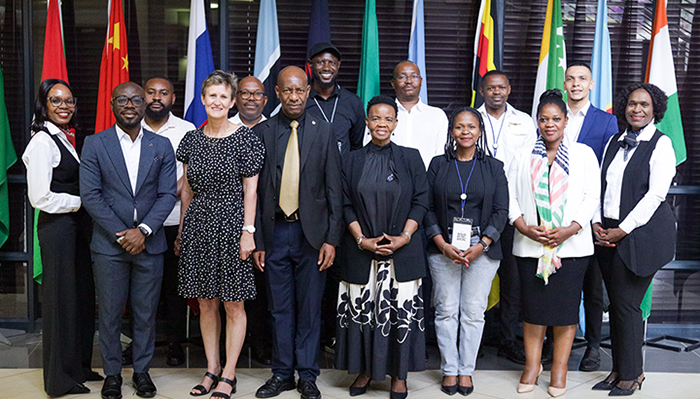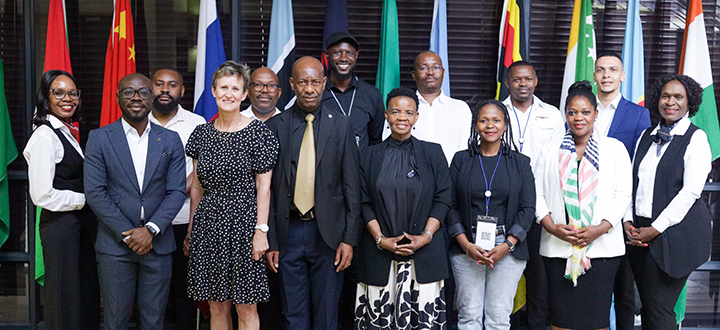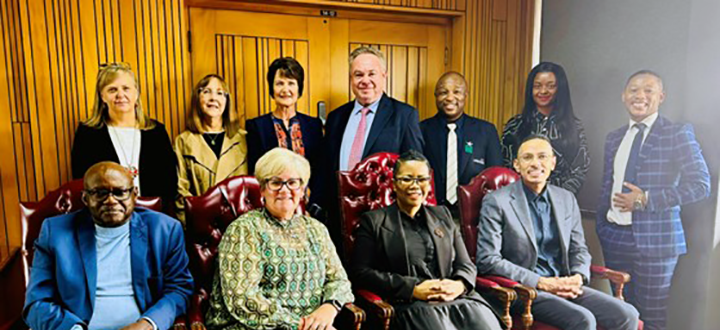News & Media
Unisa symposium shares knowledge on building SA's aviation economy

Front row, from left: Mary Marodi (Acting Manager: Communication and Marketing, Gauteng Region), Dr Ayodele Ojedokun (University of Johannesburg), Dr Erin Naude (Acting Regional Director: Gauteng Region), Prof Moloko Sepota (Unisa Registrar), Moipone Masalesa (Former Regional Director and initiator of the Aerotropolis: Gauteng Region), Noxolo Kunene (President of Women in Nuclear South Africa and Senior Manager at Necsa), Dr Mutsa Mugangavari (International Committee of the Red Cross) and Dr Smangele Ntuli (Acting Deputy Director: Gauteng Region)
Hosted by Unisa’s Gauteng Region, the three-day Aerotropolis Symposium commenced on 29 October 2025. The event provided a platform to share experiences, skills and knowledge on building an inclusivity-driven airport economy. The key focus of discussions was on skills, policies and infrastructure
The symposium ran until 31 October 2025. Academics, policymakers and industry leaders deliberated on the multifaceted analysis of the aerotropolis model, diversifying transportation systems to stimulate economic growth and unlock the potential to enhance global competitiveness.
The theme of the symposium was "Building an integrated aerotropolis: innovation, connectivity and sustainable growth for Africa's aviation future". The Gauteng Region collaborated with Unisa’s College of Science, Engineering and Technology (CSET) and College of Economic and Management Sciences (CEMS) to facilitate this project.
The Aerotropolis Symposium was designed to raise critical questions on its long-term sustainability, equitable development and integration with existing urban frameworks; contributions that are particularly pertinent in Africa’s rapidly evolving socio-economic landscape. Africa’s aviation sector is poised for expansion, with the integration of airports into broader urban ecosystems. This presents a unique opportunity to catalyse inclusive prosperity, drive innovation and improve mobility across regions.
Aviation and aeronautical studies niche area
Delivering the opening and welcoming remarks, Prof Moloko Sepota, Unisa Registrar, stated that the symposium is fundamental, as aviation and aeronautical studies have been identified among the university’s ten catalytic niche areas, and is one which supports a major component of the country's economy. He also acknowledged that colleges and the Inhlanyelo Hub played in executing the project. "All voices, experiences and views should be heard," he said.
Moreover, Sepota reiterated the importance of stakeholder participation and noted, "Nothing can be achieved without open engagement, transparency, involvement and participation". He added, "This is not about who is doing better than who, but rather about what we are all doing better in securing a solid legacy for the coming generations".
Sepota remarked that the region’s aim for the symposium is to provide a meaningful opportunity to leave visible milestones upon which a sustainable aerotropolis can emerge. "May this be the first of many similar encounters, where identified developing trends, and progress feedback can be shared," he concluded.
Sustainable aviation and aerotropolis for Africa’s vision
The first day of the symposium coordinated three panel discussion sessions. These scientifically stimulating discussions featured presentations and speakers of the International Committee of the Red Cross, International Women in Transport, Gauteng Management Agency, Dube Tradeport, Wonderboom Airport, Marakanelo Travel and Events, the South African Aviation Authority, Air Traffic and Navigation Systems, Directorate of Technology Transfer and Commercialisation, the Council for Science and Industrial Research, Aerospeace-3D and the South African Nuclear Energy Corporation. Panellists provided a multifaceted analysis of the aerotropolis model, highlighting its potential to enhance global competitiveness, stimulate economic growth, improve connectivity, and diversify transportation systems.
Panel discussions and presentations focused on the following:
- South Africa’s aerotropolis master plans and concepts
- Military systems and tactics influencing aerotropolis
- Importance of education-industry collaboration and partnerships
- Role of law and aviation in humanitarian relief
- Aerotropolis policy alignment across public and private institutions
- Project of KwaZulu-Natal’s Dube Tradeport
- Infrastructure investment and national development plan
The inaugural Aerotropolis Symposium was a success, as it provided speakers and delegates with an opportunity to examine powerful aerotropolis frameworks and build on knowledge for future-ready African cities.
* By Lesego Chiloane, Journalist, Department of Institutional Advancement
Publish date: 2025-11-03 00:00:00.0


 Disability awareness at Unisa: Disability is not inability
Disability awareness at Unisa: Disability is not inability
 Unisa symposium shares knowledge on building SA's aviation economy
Unisa symposium shares knowledge on building SA's aviation economy
 SAICA Accreditation Review Team visits Unisa
SAICA Accreditation Review Team visits Unisa
 Unisa doctoral voices: stories of grit, growth and greatness
Unisa doctoral voices: stories of grit, growth and greatness
 Early identification of neurodiverse disorders will enhance mental health access
Early identification of neurodiverse disorders will enhance mental health access